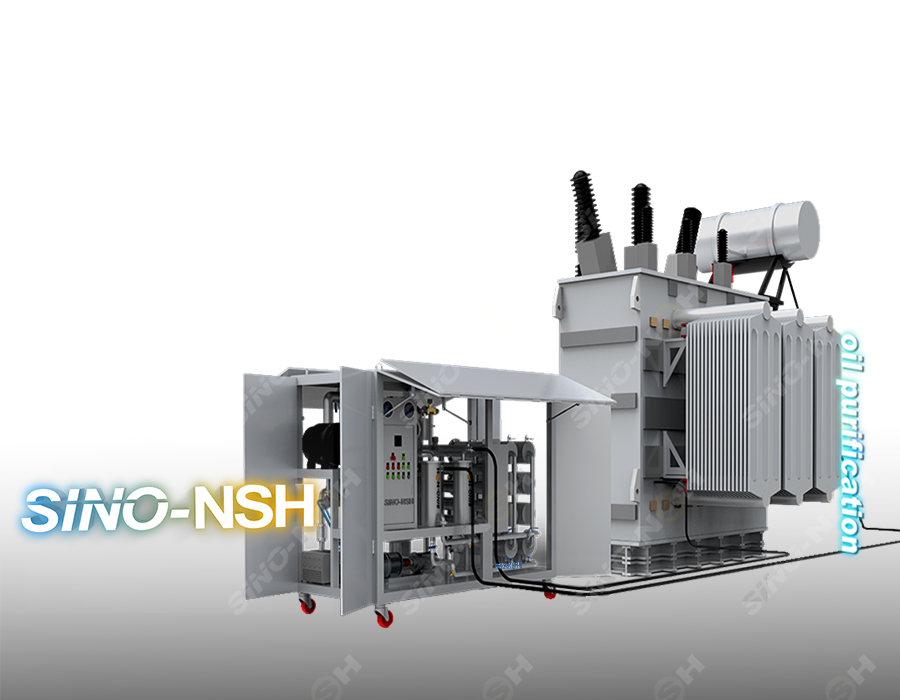Filtering transformer waste oil (also called used insulating oil or dielectric oil) is essential for several reasons related to the efficiency, safety, and longevity of the transformer. Transformer oil is used to insulate and cool electrical transformers, and over time, it can become contaminated with various impurities, including dirt, moisture, acids, sludge, and metals. Filtering this waste oil is necessary to maintain the proper functioning of the transformer.

Why it’s important to filter transformer waste oil:
1. Remove Contaminants and Impurities:
- Dirt, Dust, and Debris: Over time, particles from the environment and wear inside the transformer can accumulate in the oil, affecting its insulating properties.
- Water and Moisture: Moisture in the oil can drastically reduce its dielectric strength, leading to a higher risk of electrical breakdown or failure. Water contamination can occur due to leakage, condensation, or atmospheric humidity.
- Acids and Sludge: During normal operation, the oil can undergo oxidation, which results in the formation of acids and sludge. These by-products can corrode the transformer’s internal components, damaging the insulation and leading to equipment failure.
- Metallic Particles: Small metal fragments can enter the oil from internal mechanical wear or damage to transformer components. These particles can affect the performance of the oil and accelerate deterioration.
2. Maintain Dielectric Strength:
- Transformer oil is crucial for its dielectric properties, meaning it helps prevent electrical arcing and short circuits between the transformer's live components. Contaminants like water and sludge can significantly reduce the oil’s dielectric strength, leading to the risk of electrical failure.
- Filtering the oil ensures it maintains its insulating capabilities, which is critical for the safe operation of the transformer.
3. Prevent Transformer Overheating:
- Transformer oil serves as both an insulator and a coolant. Over time, contaminants build up in the oil, which can impair its ability to cool the transformer effectively.
- Filtering helps remove these contaminants and restores the oil's cooling efficiency, thus reducing the likelihood of overheating, which can degrade the transformer’s internal components.
4. Prolong Transformer Life:
- Regular filtration helps extend the service life of the transformer by maintaining the quality of the insulating oil. By keeping the oil clean and free from impurities, you can prevent premature breakdowns and extend the lifespan of the transformer itself.
- Filtering the oil also reduces the wear on transformer components, such as bushings and windings, which are sensitive to contaminants in the oil.
5. Prevent Breakdown and Failures:
- Accumulation of contaminants in the oil increases the risk of arcing or short-circuiting in the transformer, which can lead to catastrophic equipment failure and unplanned downtime.
- Regular filtration ensures that any potential risks related to contamination are minimized, thus preventing costly transformer failures.
6. Improve Performance:
- Contaminants in the oil can cause irregularities in the performance of the transformer, leading to inefficiencies in power transmission and increased operating costs.
- Clean oil ensures that the transformer operates at its optimal efficiency, which is vital for maintaining a stable electrical grid and reliable power supply.
7. Environmental Compliance and Sustainability:
- Used transformer oil contains hazardous materials, including potentially toxic chemicals and heavy metals. Proper filtration and recycling of transformer oil can ensure compliance with environmental regulations and reduce the risk of contamination to soil, water, and air.
- Reconditioning and reusing the oil by filtering it can be more environmentally sustainable than simply discarding it and purchasing new oil.
8. Cost-Effectiveness:
- Filtering and reusing transformer oil can be more cost-effective than replacing the oil entirely. Oil replacement is expensive, and disposing of contaminated oil can incur significant costs, both in terms of disposal fees and environmental impact.
- Reconditioning the oil through filtration can save money, especially if the oil is in good condition but contains contaminants that can be easily removed.
9. Compliance with Standards:
- Many countries and industries have strict standards for the quality of insulating oils in transformers. Regular oil filtration helps ensure that the transformer oil complies with these standards, preventing the transformer from being taken out of service due to subpar oil quality.
Common Methods for Filtering Transformer Waste Oil:
- Centrifugal Filtration: This process uses centrifugal force to separate impurities based on their density. It's effective for removing solid particles and water.
- Vacuum Filtration: This method is often used to remove water and moisture from the oil. It reduces the moisture content in the oil and restores its dielectric properties.
- Clay or Adsorbent Filtration: Some systems use clay or other adsorbent materials to remove acidic by-products and contaminants in the oil.
- Distillation: In some cases, distillation may be used to purify the oil by removing volatile contaminants and restoring its quality.
Conclusion:
Filtering transformer waste oil is essential for maintaining the transformer's performance, extending its service life, and ensuring safe and efficient operation. It helps in keeping the oil’s insulating and cooling properties intact while reducing the risks of contamination-related failures. Regular maintenance, including oil filtration, is crucial for ensuring that the transformer operates smoothly, reduces downtime, and complies with environmental and safety standards.
If you're involved in maintaining or operating transformers, regular oil testing and filtration should be part of your routine maintenance to ensure the optimal functioning of the equipment.

